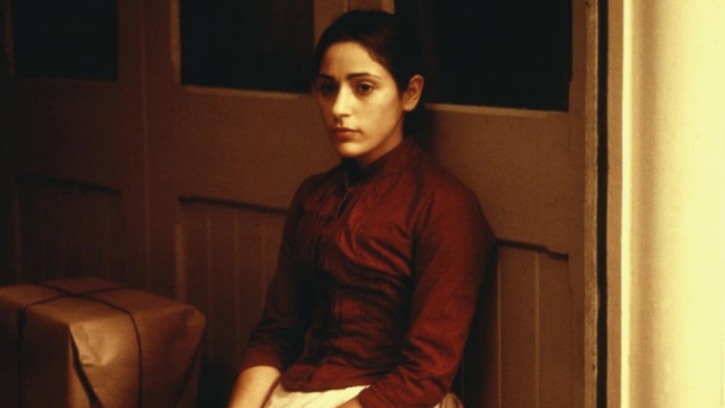France, UK, 2000
Directed by Arnaud Desplechin
With Summer Phoenix (Esther Kahn), Ian Holm (Nathan Quellen), Fabrice Desplechin (Philippe Haygard), Frances Barber (Rivka Kahn), Lászlo Szabó (Ytzhok Kahn)

When she was a girl, Esther Khan was plainly unattractive and awkward. She lived in a poor London neighborhood with her large Jewish family: her father Ytzhok, who is a tailor barely eking out a living and makes all his family work in a big apartment which is both a workshop and a home, her mother Rivka, who tries to like the girl but easily teases her, an outspoken brother and two confident sisters, as well as Ytzhok’s mother. She doesn’t really enjoy this life and seems to be aloof from her milieu.
As she becomes a late teenager, Esther Khan still looks sullen and timid. Her desire for a better life is undermined by the hard demands of his father’s trade, which she disliked, and touchy relationships with her relatives. She is courted by a young man from the same ethnic and social background but this love leads to nowhere. She decides to get a job in a factory and to pursue a personal interest in theater, a move that puzzles her relatives and jars with her poor writing skills and puny knowledge of literature.
But she would become an understudy, then an actress, and eventually a lead actress playing bold texts (in this case Henrik Ibsen’s “Hedda Gabler”). She owes her success to a close relationship with an ageing actor, Nathan Quellen, who teaches her the skills and the philosophy of their job, and with a young writer, Philippe Haygard, who opens to her the gates of high culture, helps her to meet people who matter in this new milieu and makes her find what love is. The oldest of these guides keeps supporting her even as the youngest abandons her, fostering a personal crisis. But at the end Esther Khan triumphs on stage and in her life.
Based on a short story by the late Victorian writer Arthur Symons, the film firmly and realistically wraps the characters in a gray, dirty light and in an environment thoroughly dull (even the limelight just dims) and cold. It suits the particular atmosphere of the destitute places and the harsh period (the author’s era) and even more Esther’s nature. Weeks after his lessons finished, Nathan Quellen is called by the actress who feels something is lacking her; his answer is candid; she can’t do better in her roles since she is cold-hearted. She can’t readily accept his point but thinks over it, to Haygard’s benefit.
The boldest move of this biography is probably a frank emphasis on sexual desire as the strength shaping both a person and her career. Practical hurdles and moralistic repression are depicted in a nutshell with a stunning incident involving her mother catching Esther masturbating and starting a histrionic ramble – she is trapped, like other people of her time, by living conditions forbidding intimacy and principles demanding marriage. But Esther is not really interested by conjugal bliss; she is on to something entirely different and more rewarding. Answering lately to the question she was asked by one of her sisters years ago, she can now tell the big thing, what she desires the most in the world – and it is on the stage.
Nathan’s remarks sting and point to her longtime difficulty (her childhood’s images come to mind) to assert herself, including with her body. That she has no stage-fright is remarkable enough, but her physical presence is still clumsy. Her liaison with the drama critic frees at long last her sensuality and also opens her mind to the awkward relationship with a lover’s demands and flaws. This affair ends up in a disaster but it leads to a mesmerizing climax. It is probably one the most chaotic opening night ever shot but it relentlessly and movingly captures a woman at loss crossing a threshold and turning her rage against the former lover (who is parading with a foreign dancer in the theater’s hall and boxes) into the perfect ability to make believe into a character. Her journey is over and she has grown into a woman seasoned by love’s experience and the labor that turned a passion into a successful career.
Summer Phoenix, then relatively little-known, fares well in the daunting task of conveying a yearning for self-expression and success stifled by a pent-up and timid nature and unfavorable origins and then to express the tormented metamorphosis that leads to success. Ian Holm is an inspired teacher and his lesson on the many feelings an actor or actress can experience just by crossing the stage on a straight line is riveting. Fabrice Desplechin is fine at capturing the off-hand, self-indulgent, nature of his character, easily fascinated by the riches of love. They help make compelling a project whose lead character and themes are not. But the film could have been greater with a bolder montage and less reliance on Symons’s words – the camera and the actors were skilled enough to convey all the feelings, some cues could have been given by a few title cards, a slightly faster rhythm would have nicely accompany the tensions inherent to the story. Esther’s story, despite these little flaws, remains an engrossing and moving tale of a dream come true and victorious womanhoood.

